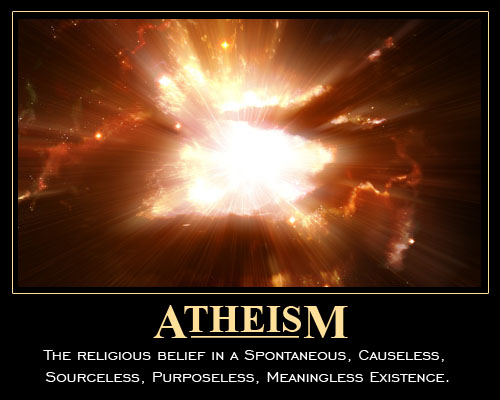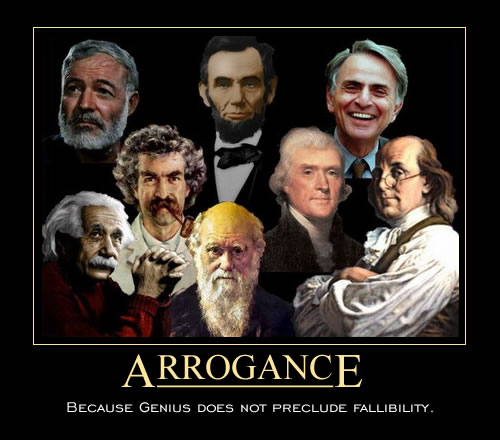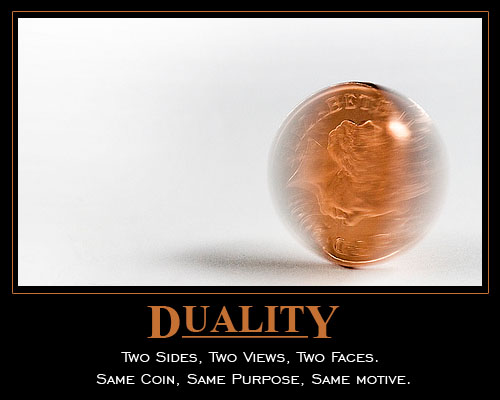Atheism Exposed: The Motive
“Without proof, belief is still belief – even if you believe in nothing.”
– Xenocrates

Is Atheism a religious belief? Most would argue no, since atheism is purportedly anything but religious. However, of late I’ve been observing a pattern among atheists that has made the entire movement frightfully indiscernible in motive from the very religious proponents they seek to rebut. The trouble lies in the fact that the argument between the two camps is about insubstantial belief – something that is unquantifiable one way or another. As a result, both sides of the fence are making all of the same mistakes – which is why their motivations must be called into question. That is the point of this post. Nonbelievers and people with imaginary friends, follow me for a moment. I have a few things I want to pick your brains about.
The Personality of Atheism
Atheists are not intrinsically bad people. Many of them are just individuals who’ve become frustrated with the fallacies and bigotry of religion in their genuine quest to find answers. It could happen to anybody quite frankly. In fact, many of the people who are openly atheist actually grew up in strong religious circles. Of course, what usually happens is that during the teen years, they started to ask questions that no one could answer. That’s when they pretty much stopped drinking the Kool Aid™ – so to speak.
However, along the way many of them have become cold, cynical, vitriolic and calculating towards their theist counterparts. This is despite the fact that the original premise behind the atheistic movement is one that encourages open thought and debate born out of humility while eschewing bigotry and fundamentalism. This I can work with. Today however, a lot of it is becoming something else altogether and quite frankly, that bothers me for all the same reasons overzealous Christians do.
Atheists have tried so hard to separate themselves from religious movements, that they have become anything but. They’ve got their own gatherings, teachings, ritualistic argumentative techniques, pamphlets, websites, evangelists and yes, even radio and TV broadcasts. In fact, in the recent Bill Maher film “Religulous“, he makes no bones about being an evangelist of doubt. Others like the Rational Response Squad act as a support community for fledgling Atheists just “coming out of the closet.” If the whole idea of atheism hasn’t started to smack of hypocrisy by now, read on.

The Deep Thinkers
The people who become atheists are usually more left brain reliant than those who are more inclined to be religious (which is also why the average atheist is likely to be male). This gives all atheists a clear cognitive advantage over most theists. Being predominantly left brained means they’re more rationally inclined and thus better able to formulate what appear to be solid, compelling arguments. It’s really nothing more than needless brain gymnastics, but I’ll get to that in another post.
These deep thinkers can see logical flaws in traditionally accepted arguments that are often overlooked by most theists. The average layman is often no match for a scientist in a game of logic. This is why most times, the average theist is no match for the average atheist in a full-on religious debate. Most theists don’t feel inadequate enough about their belief to question it (and to be honest, they are by extension quite gullible). So when a religious subscriber goes up against an atheist, most of the times it’s the same thing as pitting Bambi against Godzilla.
An atheist’s heavy reliance on logic often inhibits that emotional propensity that would facilitate any meaningful religious subscription. So if religion is right, people who are likely to become atheists would be doomed by virtue of being insufficiently right brained to possess the capacity for any religious affinity. That makes most discussions about the utility of religion utterly meaningless with most atheists – yet people do it anyway. (More on this later).
There is nothing inherently wrong with being a deep thinker. It’s a very useful skill to have – especially when it comes to sniffing out con-artists, zealots, fascists, bigots, right-wing fundamentalist presidents and every baddie in between who comes “in the name of the Lord“. The problem however is that deep thinkers have tendency to think that because they’ve thought so much about an issue, they couldn’t possibly be wrong – and thus the inherent arrogance of Atheism presents itself.
The Arrogant
Not surprisingly, many of the people who are atheists are also members of the scientific community. So it’s not hard to see where some of the arrogance comes from. Unfortunately, their strong cognitive affinity is also what often gives them the propensity to observe everything in tunnel vision. They’ve spent so much time observing a problem one way, that they often forget that it can be observed in another – and this is usually what frustrates them.
Remember when scientists thought that Evolutionary theory was airtight? This is not unlike the religious pundits who assert with impunity that one religion is better than another. It’s the same kind of arrogance – just a different source. After fielding hundreds of questions that exposed clear gaps in theories proposed by Darwin and his contemporaries, scientists later had the good sense to remind themselves that sequence does not necessarily imply causation as no one lives long enough to see evolution in action. That’s why it’s still just a theory.
Even so, people often forget that nothing is absolutely certain. Anyone who has faith in science should know that even proof can be overturned. The better scientists out there always temper their declarations around this idea. Yet, the arrogance persists among atheists who frequently quote science as their Bible of sorts. Even with science, we can’t know everything for certain. That’s why we have faith that our empirical proof is trustworthy.
Even so, we’ve only certified our proof to be trustworthy so far. We have faith that the proof will remain true for all instances throughout the universe. But on more than one occasion, that proof has failed us, because we realised that we didn’t fully understand it. That’s why our trust in science is based on faith – regardless of the method or degree of meticulous scrutiny. As such, science is nothing more than a well structured religion. This is where the duplicity of Atheism exposes itself.
The Duplicitous
I’ve discovered that in most cases, Atheists primarily attack religions that won’t fight back (anymore). Atheists have gone ballistic on Christianity (and so have I) – but have been rather slow about attacking Islam by comparison. This is not hard to understand. While most Christians will at most hurl verbiage back at them, Muslims are not timid about going on the offensive with a view to draw blood for the smallest insult – even if it costs them their own lives.
So I’ve got to ask: Are there any atheists out there who are willing to die for the cause? Most probably not. It’s highly likely that they subscribe to the notion that death is final and therefore one should live their life to the fullest. Therefore that most certainly does not include blowing one’s self up for nothing. Pun intended.
Christianity is easy to attack because it is passive and ubiquitous – like how Microsoft Windows is preyed upon by hackers who avoid Linux. 1200 years ago though, atheists would never do that. They’d run the risk of being burned alive at the stake. They, more than anyone else, are grateful for freedom of speech – which they simultaneously use to attack other’s freedom of religion. Fascinating, isn’t it?
That is why I’m curious about the following things: Why do unbelievers issue a challenge to folks who are religiously aligned to commit blasphemy? Why hurl foul language at those who believe just because they want to? How does that make one who chooses not to believe any better than the zealots who do? To what extent must those who choose not to believe commit the same ideological crime as those who choose to? Why debate the idea of belief with a believer, when the only difference is the method of the belief? Speaking of debates;
The Futility of Debating Belief

I’ve been in many religious debates and in retrospect, I’ve learned that for the most part, they serve very little useful purpose. My eyes were opened when I first realised that most of these debates are driven by the same forces. People who believe in a thing don’t necessarily do so because it makes sense. They do so because they choose to. This goes for both atheists and religious pundits alike. This is what automatically renders such debate pointless.
You can’t use logic to convince someone who chooses to believe to drop their faith. Similarly, you can’t convince someone who uses logic to convince themselves not to believe to emotively connect with spurious ideology. So unless there is an obvious and risible reason to engage in such debate (such as the imposition on the freedoms of others), the debate is most probably a waste of time. After all, these debates are all about speculation, not fact.
Is Atheism a Belief?
Some atheists may be wondering at this point; “You’re talking about belief. So what does this have to do with atheism?” Everything, quite frankly. Being an atheist doesn’t mean that one is absolved of belief. It only means that (as one atheist so aptly put it), the belief is limited to “one less god” than their monotheistic counterparts ascribe to. Believing in no god of any sort is still a belief. It is just as unquantifiable as belief in one.
I know what you’re thinking: “But the burden proof lies on those who posit that God exists”. Does it really? Not quite. Neither side of the argument has any credence over the other since both require evidence beyond our capacity to produce. You can’t unequivocally prove or disprove God using empirical evidence as it is subject to interpretation. There is no right or wrong answer with interpretation since it is entirely subjective.
Here’s the problem; Where one person sees chaos, another may see harmony. We can debate both terms until the universe expands into infinity – but it won’t make a difference. The bottom line is that both ideas are still theories. There is no way to substantially and unequivocally quantify either. The godless infinite universe is a theory. The finite, God created universe is also a theory. Until we build a spaceship that can traverse space/time – they will remain just that: Theories.
What do we know about theories? They help us to make sense of the universe. However, they are nothing more than speculations based on (possibly misinterpreted) observations of our universe. So when we debate theories, we can’t do it under the premise that they are infallible. Otherwise these kinds of debates will all fail for the same reason. Without proof, belief is still belief – even if you believe in nothing.
The Debate is Debatable
So if these are just theories, why get into debates about it? The motive is simple. Each side of the fence cares only about validating what they believe – not to the other party, but to themselves. Each debater is only concerned about stating his point and convincing the other that their point is the only valid one. Neither has any intention of conceding any point because it would put a dent in their own belief system – and neither side wants that.
This is what creates debates that go round and round in vicious, often hostile cycles. Both parties are debating speculative points. Neither side can unequivocally prove what they chose to believe. Both sides are trying to indoctrinate each other. Neither side is prepared to learn anything from the other. This is the definition of deadlock where both parties have become intertwined in an endless, circular battle of “pin the tail on the fallacy“.
Finding a way out of such discussions is hard, as ego quickly becomes the primary motivator on both sides. That’s when the ad hominen remarks start to fly, particularly when the offending debater runs out of ammunition. It never fails. This is why, more often than not, the only people who bother with such debates in the first place are those who care less about its futility and more about justifying their opinion to themselves. Concordantly, such debates are rarely useful for anything more than ego propping and chest beating.
The Closed Minded Attitude
Someone who is compelled to believe one thing (or has already made up their mind to hold on to a particular concept) has no reason to be engaged in a debate of any kind. Why debate an idea that relies on faith when you’ve already made up your mind? It’s a useless waste of time for both parties. The exercise is useful for nothing more than meaningless brain gymnastics (which I will demonstrate in later posts).
For example: One atheist told me recently that he “has no room in his life for God“. If that is so, why argue with a theist about whether or not God exists? How is that different from a Muslim who says “Allah or death” or a Christian who says “Jesus is the only way“? Isn’t that the same kind of close minded attitude? If someone declares that there is a God (in whatever nonsensical manner he goes about doing so), how is an atheist who chooses to argue with him any different from a theist who proactively goes out to promote their faith? Isn’t that the same thing?
I’ve long discovered that debating the existence of God with atheists often proves to be just as fruitless as debating the Sabbath with Seventh Day Adventists, the credibility of Joseph Smith with Mormons, the definition of the Soul with Jehovah’s Witnesses, the duplicity of the prophet Mohammad with Muslims and any key point of contention with any other flavour of faith out there. Yes. I’m using the right word when I say “faith“. Get over it.
Irrespective of what people believe, they have already been deeply rooted into what they believe. Unless they have an open mind, the debate is useless. All religious debates are about speculative ideas. So the motive that many atheists have in their debate is not very different from that of many people who subscribe to religion. Thankfully, this is obviously of course, not a description of all atheists.
The Ulterior Motive
Some atheists disbelieve in God because they genuinely have doubts about the far flung nature of religious belief. Unless you were socially programmed by your parents as a child, it does require a great deal of suspension of rationality to believe in a 5,000 year old mythology imbibed from the Egyptians – and that is understandable. You can tell who those atheists are, because they don’t dictate what they believe. They ask questions. Their motive is driven by genuine humility, curiosity and a desire to learn.
Other atheists however have gone off the deep end and are indistinguishable from your average run-of-the mill religious zealot. They’re the ones who hurl obscenities at religious pundits, infringe on others’ freedom of religion and generally hate (and I’m not using the wrong word here) virtually anyone who has even so much as an imaginary friend. They are bothered by the irrationality of behaviour tied to religion because they see it as a threat to society, even in its most benign and inconspicuous form.
The atheists in the latter category scare me quite frankly, because they often obscure the atheists in the former. Just as how people have used religion to justify horrific behaviour in the past, these anti-Christs can use very compelling logic to justify why religious subscribers are dangerous to society. It’s really not hard to do, since a good logically structured argument is always compelling, whether it is pro or anti-religion, and irrespective of whether or not it actually makes sense.
Just as how a religious zealot in a position of power can incite a war that claimed the lives of thousands of people with an ulterior motive, a strong atheist in a position of power is not very far away from inciting a violent, anti-religious revolution under the guise of social reform. This is why I fear aggressive atheists for all the same reasons I fear aggressive religious pundits. If they could get their hands on a pen that is mightier than the sword, then may God, (irrespective of whether he exists or not), help us all.
Conclusion

Atheists who are just unconvinced about the existence of God are the true representatives of the movement. I think a good healthy provocative discussion is useful for keeping everyone relatively critical to avoid deception. I think it’s good that people are provoked into keeping an open mind about things. Chalking up everything that we can’t explain to mythology does defeat the object of cognitive evolution. We are too old a civilization to still be doing that. However, we mustn’t use that knowledge to believe that our ape brains have limitless potential.
Atheists who go about challenging the right of others to practice their religion in peace, provoking anger through indoctrination, hurling obscenities at religious pundits who question their motive and openly mocking religion for sport are not true atheists. They are bullies – plain and simple. They are no different from the Muslims who use fear to spread their religion, or the Christians who destroy families “in the name of the Lord“.
Atheism is a means for these bullies to compartmentalize their hostility, thus justifying their inexcusable behaviour. Such atheists are dangerous for all the same reasons religion can be dangerous, because they’re doing exactly the same thing – just under a different banner.
Atheism and Religion are two sides to the same coin. They have two views and opposing faces. However, they are each derived for the same purpose and motive; the innate propensity of mankind to attempt the act of making sense of his universe. It doesn’t matter what you choose to believe in that context as it has little or no consequence without motive.
Motive more than anything else defines what we believe. One may choose to believe that there is no God because it makes their life easier. It does free one from the responsibility of thinking that their past deeds are going to catch up with them. It is truly liberating. On the other hand, one may believe that God exists because it makes life more soluble. It does inspire hope to think that there is life after death. Motive gives both sides of the fence traction and purpose. It has absolutely nothing to do with whether or not it is quantifiable, provable or justifiable.
Every religious person who chooses to believe can give you a reason (not necessarily a sensible one) but a reason none the less, why they believe. Every non-religious person can do the same. So the question is really not what you believe, or how you came to believe, but why. The best way to answer this question is to ask yourself:
How would I feel if there really was (in the case of Atheists) or wasn’t (in the case of theists) a God?
In answering this question, some atheists would respond that they would choose not to worship a tyrant. Some theists would respond that they would feel a sense of hopelessness. Either way, if we had the capacity to truly and honestly answer that question, then the real motive behind of our belief would be immediately exposed.

Next: Atheism Exposed: Agnosticism
■ E-mail: accordingtoxen[at]gmail[dot]com



Всем перила в Самаре,перила из нержавейки самара,ограждения в самаре,ограждения из нержавейкиперила в самаре! Наш сайт .